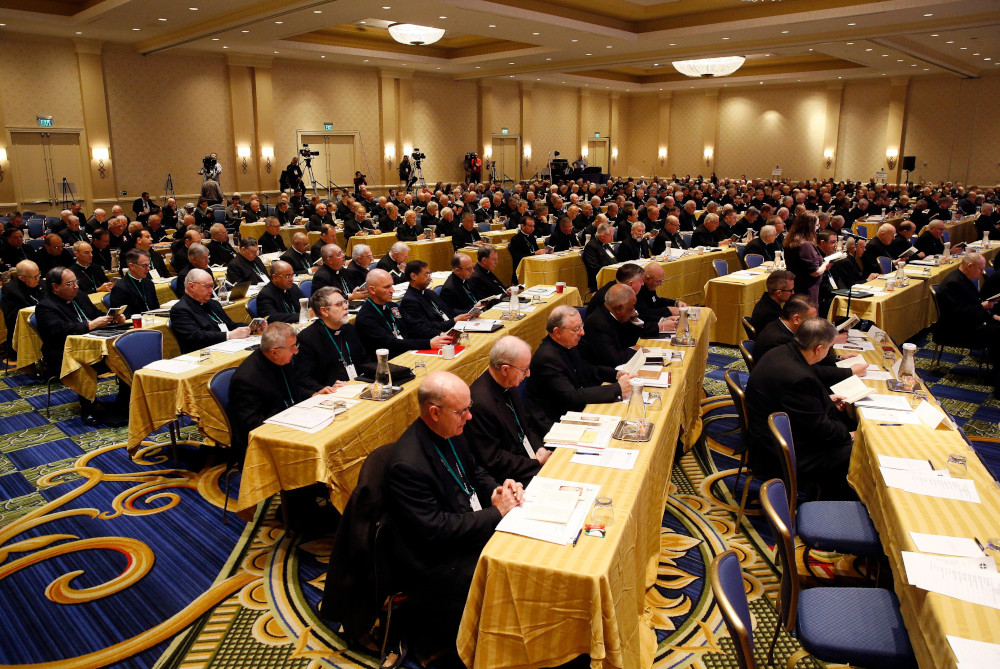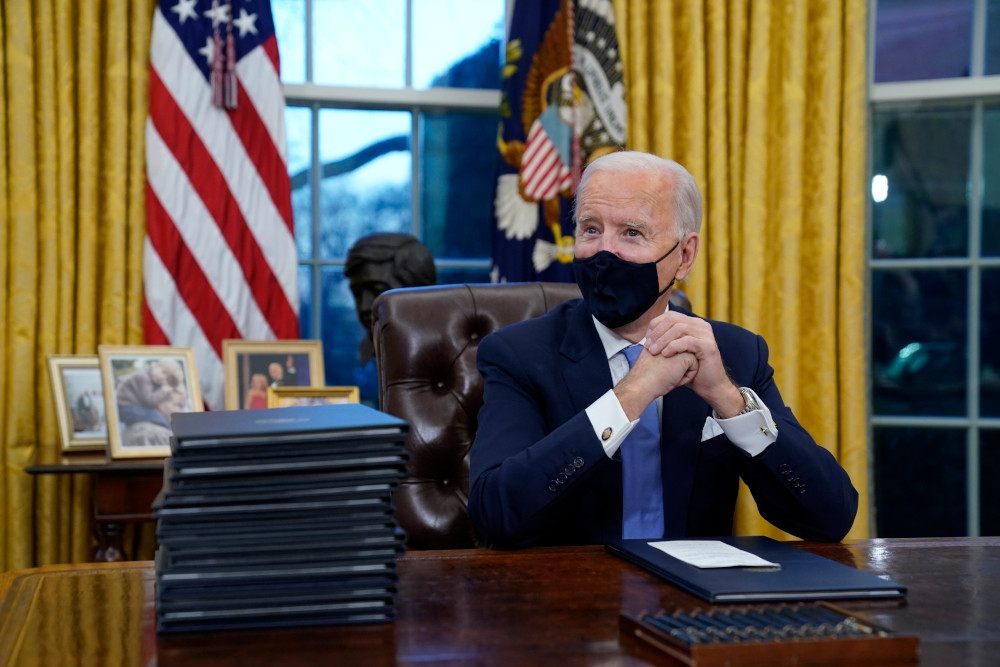
Members of the United States Conference of Catholic Bishops gather for the conference's annual fall meeting, on Nov. 12, 2018, in Baltimore. (AP/Patrick Semansky)
The American Catholic bishops have responded to the extraordinary number of executive orders from President Joe Biden with an extraordinary number of press releases of their own. The press releases are noteworthy not only in their number but also in their positive tone.
The day Biden was inaugurated as president, he was greeted by what even some bishops saw as a very negative statement from Los Angeles Archbishop Jose Gomez, the president of the U.S. Conference of Catholic Bishops. Although Gomez's message began positively, noting Biden's piety, a series of paragraphs followed that outlined areas where the bishops' conference disagreed with Biden policies.
Many, including several Vatican officials, thought the statement was too negative for the occasion. In an unusual move, Cardinal Blase Cupich, archbishop of Chicago, criticized Gomez's statement.
"Today, the U.S. Conference of Catholic Bishops issued an ill-considered statement on the day of President Biden's inauguration," he tweeted. "Aside from the fact that there is seemingly no precedent for doing so, the statement, critical of President Biden, came as a surprise to many bishops, who received it just hours before it was released."
Since Biden's inauguration, the bishops' conference has been busy putting out press releases that for the most part welcome and embrace the new administration's policy initiatives, including those that reverse core policies of the Trump administration.
In 10 press releases in 15 days, the bishops supported the administration in a wide range of policies on the environment, immigration, foreign policy, health care and the economy.
- U.S. Bishops' Domestic Chairman Expresses Support of Executive Orders Protecting the Environment, Feb. 3
- Bishops' Migration Chairman Welcomes Administration's Actions to Rebuild Immigration System, Restore Due Process, and Recognize Human Dignity of Immigrants and Refugees, Feb. 3
- Bishop Chairmen Express Support for Additional COVID-Relief Package, Lay Out Priorities to Help Those Most in Need, Feb. 3
- U.S. Bishop Chairmen Welcome Administration's Racial Equity Actions on Housing and Prisons, Feb. 1
- U.S. Bishop Chairman Grateful for Administration's Early Actions to Address Urgent Food and Housing Needs, Jan. 27
- Bishops' Conference Chairmen Affirm Administration's Order Ensuring All Persons Included in Census and Apportionment, Jan. 22
- Bishops' Conference President and Migration Chairman Welcome Administration's Commitment to DACA and the Call for Legislation on Immigration Reform, Jan. 21
- Bishops' conference Migration Chairman Welcomes Administration's Initial Effort to Reform Enforcement and Protect Families, Jan. 21
- Catholic Leaders Express Hope with President's Announcement that U.S. Will Rejoin the Paris Agreement on Climate Change, Jan. 21
- Bishops' conference Chairmen Welcome End of Ban Prohibiting Immigrants and Refugees from Certain Muslim Majority and African Countries Entering the United States, Jan. 21

In this Jan. 20, 2021, file photo President Joe Biden waits to sign his first executive order in the Oval Office of the White House in Washington. (AP File/Evan Vucci)
On the other hand, the bishops' conference has not rolled over and ignored areas where it disagrees with the new administration. In four press releases, it has attacked the administration on issues of family planning, abortion and the administration's desire to impose "new attitudes and false theories on human sexuality which can produce social harms."
- U.S. Bishops' Pro-Life Chairman on White House Action to Rescind Title X Rule, Jan. 29
- Bishops Decry Executive Order that Promotes Abortion Overseas, Jan. 28
- U.S. Bishops' Pro-Life Chairman Responds to President and Vice President's Statement on Anniversary of Roe v. Wade, Jan. 22
- U.S. Bishop Chairmen Express Concerns with Executive Order on Supreme Court Decision, Jan. 22
To some, this may appear to represent confusion on the bishops' part, as if they cannot decide whether they like Biden or not. In reality, it shows that the bishops are capable of agreeing with some administration policies while opposing others.
In fact, in the Jan. 22 press release, while objecting to an executive order expanding the definition of sex discrimination, the bishops welcomed "the new administration's actions on immigration and the climate, as well as for another executive order, 'On Advancing Racial Equity,' which is nobly aimed at identifying and remedying racism and its impact on society and in government."
The bishops' conference is organized to make cooperation and opposition possible at the same time, with one committee covering pro-life activities and another dealing with justice and peace. Not surprisingly, given the Democrats' approach to the relevant issues, the bishops' Committee on Pro-Life Activities is the author of the negative press releases, while the Committee on Domestic Justice and Human Development is the author of the positive press releases, along with the Committee on Migration.
The committees also reflect the split in the conference itself, since bishops are attracted to serve on the committees that reflect their priorities. Conservative bishops want to serve on the pro-life committee, whereas more liberal bishops are attracted to the committees dealing with justice, human development and migration.
The media and both conservative and liberal commentators have joined together to play up the conflict between the U.S. bishops and the Biden administration. While it is true that conflict exists, ignoring the areas of agreement is ignoring the facts. It is bad for the administration, bad for the bishops and bad for the country.
Advertisement




